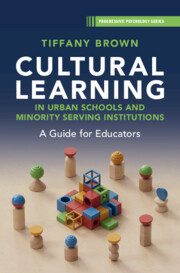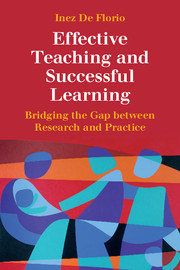Cultural Learning in Urban Schools and Minority Serving Institutions
This book provides a comprehensive analysis of the social and organizational factors shaping K-16 teachers' cultural learning processes, through both a systematic review of the extant literature on K-12 urban teacher thinking and interviews with instructional staff at a high-performing minority serving institution (MSI). It highlights common challenges K-16 educators face in navigating cultural differences between themselves and their students. Drawing from cultural psychology, organizational behavior, and organizational psychology, the book offers evidence-based insights for creating school systems in which educators working with students from low-income and other minoritized cultural communities can critically examine and challenge their cultural assumptions to create more inclusive and supportive learning environments for all students, as well as develop and implement more culturally responsive classroom management practices.
- Applies an organizational perspective on a critical human capital challenge plaguing K-16 educational contexts serving students from low- income and other minoritized cultural communities
- Provides a comprehensive review of literature from top education journals related to intrapsychic and psychosocial challenges specific to the experiences of K-12 urban teachers
- Clarifies key concepts, tenets, and terms from the action science literature for use in the educational context
- Contributes original empirical research to the higher education literature from an organizational perspective
- Reconceptualizes cultural learning as a process of organizational learning in urban schools and minority serving institutions (MSIs)
Product details
April 2025Hardback
9781009377041
277 pages
229 × 152 × 18 mm
0.564kg
Available
Table of Contents
- Introduction: how cultural learning matters for educators everywhere
- 1. An action science approach to cultural learning in urban schools and minority serving institutions (MSIs)
- 2. Directly observable data on K-12 teachers in urban schools
- 3. Culturally accepted meanings and understandings K-12 educators accept about students from MCCs
- 4. Individual action strategies urban K-12 teachers use at work
- 5. Collective action strategies urban teachers use for cultural learning at work
- 6. Single-loop learning and double-loop learning conditions in urban schools
- 7. Implications from the systematic review for four types of cultural learning K-12 urban teachers engage in at work
- 8. Empirical research on college faculty thinking and action in MSIs
- 9. Faculty value orientations for single-loop learning and double-loop learning at work with students from LIMCCS
- 10. Consequences of model i and model ii values for learning across student–teacher cultural differences in MSIs
- 11. Faculty variance in use of traditional and culturally responsive classroom management strategies
- 12. Consequences of variance in use of traditional and culturally responsive classroom management strategies for learning across student–teacher differences in MSIs
- 13. Implications from the empirical data for instructor learning across cultures in MSIs
- Conclusion: reconciling the knowing–doing gap for K-16 Educators in urban schools and MSIs.






